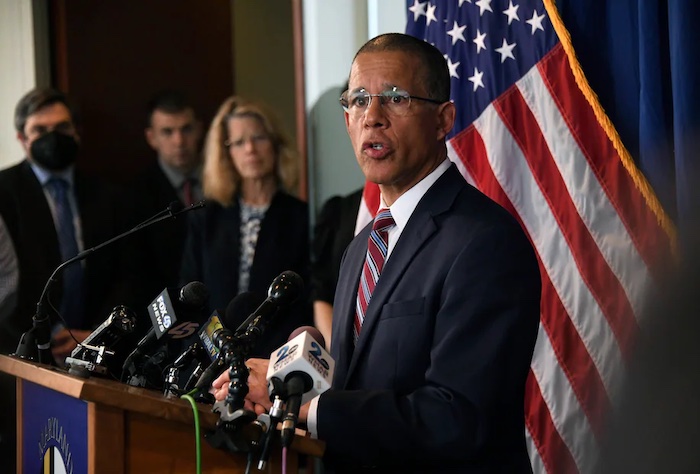— An interim report released in April on decades of sexual abuse claims within the Archdiocese of Baltimore found more than 600 victims

Maryland’s attorney general can disclose additional names of Catholic clergy accused of child sexual abuse in the Baltimore Archdiocese, a state judge in Baltimore has ruled.
The ruling by Baltimore City Circuit Court Associate Judge Robert K. Taylor Jr. also affects clergy who have held prominent positions in the Archdiocese of Baltimore and allegedly helped enable abusers or covered up abuse claims, and other people whose names surfaced in the investigation but were not accused of abuse.
Under the ruling — which was issued Aug. 16 and unsealed Tuesday — all but three names can be revealed next month when Attorney General Anthony G. Brown (D) is scheduled to make public a revised version of its report on decades of sexual abuses in the archdiocese.
“It’s good news that the judge has sided with survivors and understands the significance of releasing all the names of the predators but three,” said David Lorenz, Maryland director of the Survivors Network of Those Abused by Priests (SNAP). “Survivors get a sense of justice when their perpetrator is named. And it also helps survivors come forward.”
In deciding whether to disclose identities, the judge sought to parse responsibility between the archdiocese — which, he said, was clearly the intended focus of the attorney general’s investigation — and individuals within it.
“These names are being released because the key to understanding the Report is understanding that this did not happen because of anything ‘the Archdiocese’ did or did not do. It happened because of the choices made by specific individuals at specific times,” the judge’s opinion says. His opinion also notes that although some powerful officials appeared to willfully cover up or enable abuse, others found themselves caught in a difficult situation.
“To be clear: the Archdiocese did not sexually exploit children. Individuals did. The Archdiocese did not fail to report abuse. Individuals did. The Archdiocese did not transfer alleged abusers to positions where they could abuse again. Individuals did,” the opinion says. “Some of the individuals whose names were redacted were simply doing their job, as best they could, under trying circumstances.”
For Lorenz, however, that was going too far in defense of the church.
“He kind of tries to excuse the church,” Lorenz said. “The incontrovertible history uncovered by this investigation is one of pervasive and persistent abuse by priests and archdiocesan personnel. It is also a repeated dismissal or coverup by Catholic Church hierarchy.”
The four-year investigation — which began under Attorney General Brian Frosh (D) — found that more than 600 young people, ranging in age from preschoolers to young adults, were sexually abused at the hands of more than 150 clergy members from the mid-1940s to 2002. The investigation included interviews with victims, abusers and witnesses, and thousands of archdiocese records obtained through a grand jury subpoena into behavior that occurred at least 20 years ago. One person was charged as a result of the investigation but later acquitted at trial.
Owing to the presumption of secrecy in all grand jury proceedings, the attorney general’s office sought a court order allowing publication of the report, saying disclosure would amount to a measure of justice regarding many allegations too old or otherwise impossible to bring against the accused. After a lengthy court battle — much of which was conducted under seal and behind closed doors — an interim version was released April 4 that shielded the identities of 46 people.
By court order, the interim report redacted the identities of 10 alleged abusers who had not previously been publicly accused of child abuse, the attorney general said in a statement. The interim report also withheld the names of five clergy who played an important role in the archdiocese’s handling of abuser clergy and reports of child abuse, as well as the names of other people who were named in the report but not accused of child sexual abuse.
“We are committed to continuing all of our efforts to keep safe the children in our care, and we recognize that the Attorney General’s report is a reminder of a sad and deeply painful history tied to the tremendous harm caused to innocent children and young people by some ministers of the Church,” archdiocese spokesman Christian Kendzierski said in a written statement. “We ask all to join us in praying for all victim-survivors of abuse and for all who have been affected by the scourge of child sexual abuse.”
The new version of the attorney general’s report, which is based on thousands of subpoenaed documents, is expected to be made public Sept. 26.
Complete Article ↪HERE↩!
